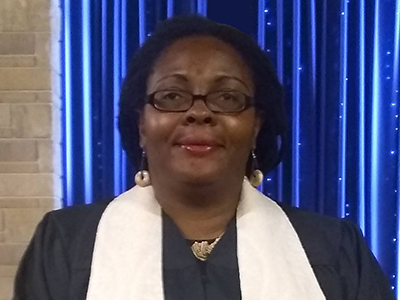Doctor of Ministry Student Tega Swann Starts in New Church to Serve Youth
Doctor of Ministry student Oghenetega (Tega) Swann came to Aliquippa and Ambridge, Pa., sensing a call to plant a new church—a call to lead people living in poverty to a church community where they understand themselves as part of God’s story. “This is a struggling community. But it is not a bad place. God led me through a two-year waiting period of listening, being part of the community, observing, connecting with folks. I received clear instruction from the Lord to pursue a different model of church planting—a model focused on children and youth.”
Formed in the Anglican and Pentecostal traditions, Tega discovered in her listening that everyone in the community claimed relationship with a church, but most of them never attended. “Within a three-mile radius there are about 50 churches, but on Sunday morning you can sit with most of your neighbors at home.” Tega identified a pattern across three generations: as adults, the children of older folks who took them to church do not now attend church, so nearly all their children—the current youth—are unchurched. “God told me, ‘reach out to that generation under 18—they will be the core of your church.’” And so it is!
Out of respect for families’ relationships with other churches, Tega first started gathering children together during the week. Among other things, their hunger sparked the new church to life.
“In the summer I saw a six-year-old and an eight-year-old wandering the streets alone and unsupervised at nine o’clock in the morning. I asked why they were on the streets. ‘I’m hungry,’ the littlest one replied. ‘Why not eat at home?’ I asked. ‘There’s no food at home. All the cereal’s gone.’”
So with the help of friends and volunteers, summer programs blossomed: $5 for an entire five weeks of programming in ballet, art, music, environmental exploration, and more. After three years of summer programs, Tega started Sunday services and welcomed the kids. She was surprised when their parents came as well. The kids brought them.
Though Tega had been clear about her call to the neighborhood, her journey wasn’t easy—especially for a woman in a community where the ministers had always been male. When racism, sexism, isolation, and segregation took their toll on Tega, she reached out to her spiritual partners around the world and asked them to pray. “Each one gave me the same response: ‘Do not leave,’” she recalls. Needing a community—a “cloud of witnesses”—Tega prayed, “I need you, God, to bring me to a community living out John 17:20-23—a community where all are welcome, no matter who they are: male or female, rich or poor, black or white, married or single.” Two weeks later, things started to happen. When PTS alumna the Rev. Dr. Judy Angleberger ’96 learned of Tega’s struggle, that prayer began to be answered. And last July, Aliquippa’s Refreshing Springs Mission Church became an official congregation of the PC(USA).
It’s that story and that context which Tega brings to her experience as a D.Min. student at PTS. Originally intending to plant a non-denominational church, she had been exploring the program’s Missional Leadership Focus prior to shifting to the PC(USA). “My search had led me to PTS because I was trying to discern whether my particular sense of call with respect to my church was theologically sound. I saw that the courses in the Missional Leadership Focus related to practical forms of ministry. They showed awareness of the complexities of ministries and the desire to address real-life dilemmas. The focus combined theology and practice.”
The D.Min. experience has been a huge “Yes” from God for Tega. Her search for theological validation of her model for ministry has been overwhelmingly affirmed by the readings she and her D.Min. cohort have shared. The readings have exposed her to different models; more importantly, they’ve led her to trust what she’s doing.
“The readings have expanded my world. They have given me hope and vision for ministry. There are moments when we pastors just don’t know what to do, and we question whether our work and ministry are meaningful. The readings have strengthened my commitment to my call,” she insists.
As to the exercises exploring context, which lie at the heart of the Missional Leadership Focus, Tega notes: “My background is in science. I didn’t know the ministry was a place where we could do experiments . . . experiments using our eyes, ears, and senses. These experiments helped me better understand my congregation—and my community!” Her guide for these experiments is PTS missiology professor, Scott Hagley, whom Tega describes as uniquely gifted for teaching D.Min. students in the Missional Leadership Focus. “Dr. Hagley has the ability to take away the fear from what we are doing. ‘We can do it,’ he’ll say. ‘There are resources. It is possible.’ I don’t know if I could have done this work without him.”
Tega says, “I want to take what I have learned and pass it on to the pastors in this community. Most importantly, now in my community, people who were not called a people are now called a people [Hos. 2:23] because of God’s work here. Black and white, poor and wealthy, educated and uneducated, old and young can gather here, where all are valued and their gifts acknowledged.” Through Tega and the other D.Min. students at PTS, such ministry in the way of Jesus is being confirmed, strengthened, and expanded in fulfilment of God’s call.

